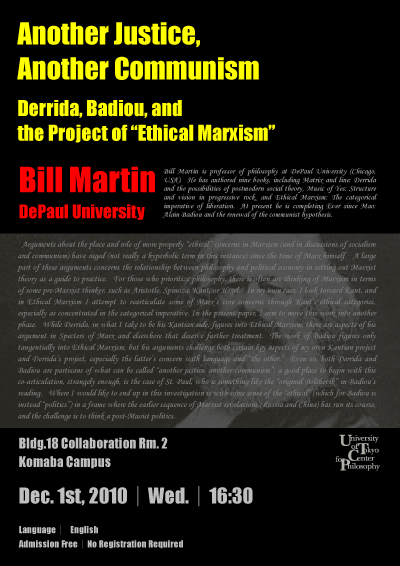
|
Title: | Bill Martin "Another Justice, Another Communism: Derrida, Badiou, and the Project of 'Ethical Marxism'"Finished |
||
|---|---|---|---|---|
| Date: | Wednesday, December 1, 2010, 16:30- |
Place: | Collaboration Room 2, 4th Fl, Bldg 18, The University of Tokyo, Komaba |
|
"Another Justice, Another Communism: Derrida, Badiou, and the Project of 'Ethical Marxism'"
Bill Martin (DePaul University)
Date: Wednesday, December 1, 2010, 16:30-
Place: Collaboration Room 2, 4th Fl, Bldg 18, The University of Tokyo, Komaba
Language: English | No registration required | Admission free
Abstract
Arguments about the place and role of more properly “ethical” concerns in Marxism (and in discussions of socialism and communism) have raged (not really a hyperbolic term in this instance) since the time of Marx himself. A large part of these arguments concerns the relationship between philosophy and political economy in setting out Marxist theory as a guide to practice. For those who prioritize philosophy, there is often a rethinking of Marxism in terms of some pre-Marxist thinker, such as Aristotle, Spinoza, Kant, or Hegel. In my own case, I look toward Kant, and in Ethical Marxism I attempt to rearticulate some of Marx’s core concerns through Kant’s ethical categories, especially as concentrated in the categorical imperative. In the present paper, I aim to move this work into another phase. While Derrida, in what I take to be his Kantian side, figures into Ethical Marxism, there are aspects of his argument in Specters of Marx and elsewhere that deserve further treatment. The work of Badiou figures only tangentially into Ethical Marxism, but his arguments challenge both certain key aspects of my own Kantian project and Derrida’s project, especially the latter’s concern with language and “the other.” Even so, both Derrida and Badiou are partisans of what can be called “another justice, another communism” a good place to begin with this co-articulation, strangely enough, is the case of St. Paul, who is something like the “original Bolshevik” in Badiou’s reading. Where I would like to end up in this investigation is with some sense of the “ethical” (which for Badiou is instead “politics”) in a frame where the earlier sequence of Marxist revolutions (Russia and China) has run its course, and the challenge is to think a post-Maoist politics.
Bill Martin is professor of philosophy at DePaul University (Chicago, USA). He has authored nine books, including Matrix and line: Derrida and the possibilities of postmodern social theory, Music of Yes: Structure and vision in progressive rock, and Ethical Marxism: The categorical imperative of liberation. At present he is completing Ever since Mao: Alain Badiou and the renewal of the communist hypothesis.







